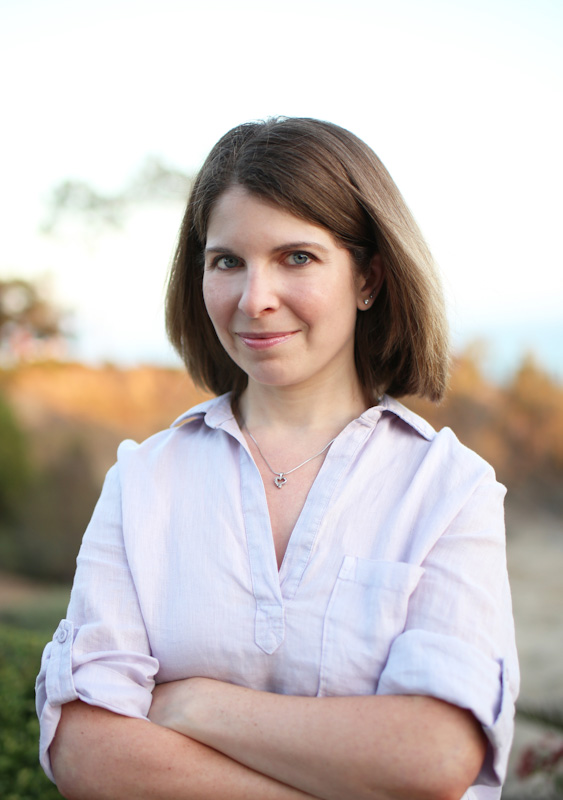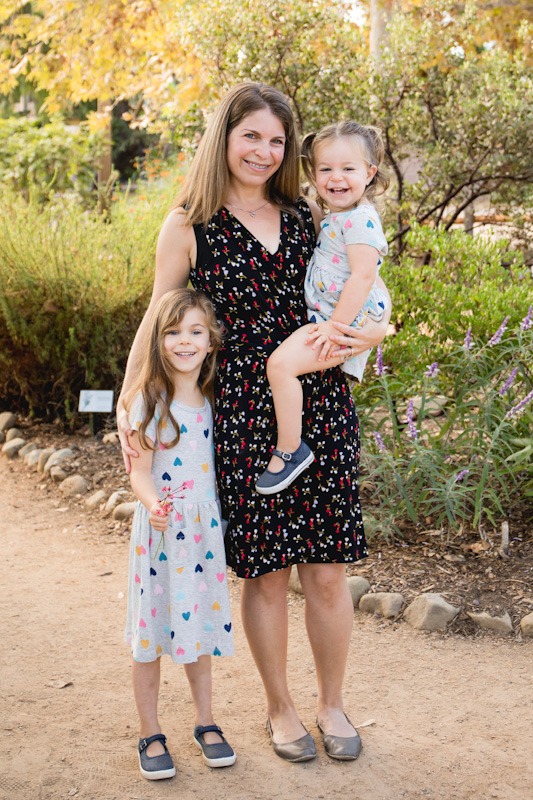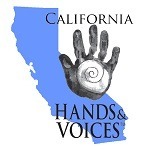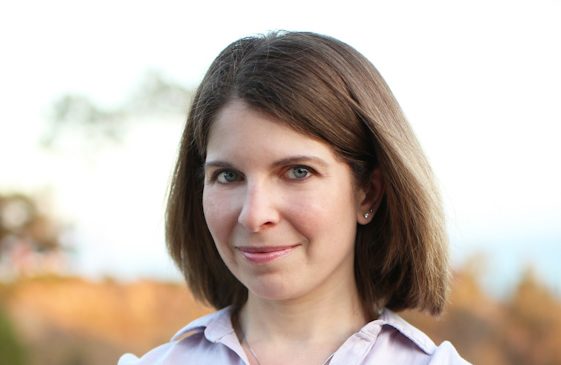I self-identify as….
Hard of Hearing
What do you enjoy doing in your free time?
Running, biking, dancing, community theater
Please tell us about your earliest years of life related to your hearing, identification etc.
I have a moderate to profound bilateral sensorineural hearing loss. It’s genetic in our family with a 50/50 chance of being passed on. If you get the gene, then you have a 50/50 chance of passing it on. If you don’t get the gene, then you never pass it down. My parents suspected from birth that I would or may have a hearing loss, however I responded well right away, and showed signs of hearing loss later when I was around 2.
Please share about your relationship with your family and inclusion tips that you have found helpful.
Our family is verbal and we always spoke. My mother had a more mild hearing loss than my sister and I, and was mainstreamed. She didn’t have a hearing aid until she was 18. She chose to also mainstream my sister and myself. In the 1970s and 1980s there was still more of a stigma around hearing loss so there were lots of ideas that one needed to wear a hearing aid that didn’t show or wear our hair down to cover the HA and try to blend in. In our family, they were used to some hard of hearing individuals, and it was always loud. We never made specific accommodations for anyone other than what we may have normally done in our family. In hindsight, perhaps things like dinners at long tables weren’t accommodated with round tables, but we never thought of it, as even though people were used to our hearing loss, We were not part of a deaf community that automatically understood what kind of accommodations people make. We lived mainstreamed in the hearing world.
Please share a little about your education placement & extracurricular activities as a youth.
In my preschool years, I attended both the Oral school for the Deaf, and a mainstream preschool. As I moved into K through grade 11 (In Quebec, Canada Elementary is from K-6, and high school is from 7-11) I was mainstreamed. The government did provide speech therapy services and I did have a speech pathologist from the same oral school for the deaf see me all through elementary and through a few years of high school. The speech pathologists would visit me at my school. It’s also worth noting that the Quebec gov’t covered the cost of a hearing aid (at least back then).
Please tell us about your relationships with DHH peers as a youth and how they impacted your life.
I had met other DHH kids time to time through events/fundraisers through the Oral School as I grew up, but I never had any DHH peers that I was friends with. There were two other Deaf kids in my high school who spoke ASL. I didn’t speak ASL, so I did not communicate with them although I wish I had been able to. I was extremely shy back then, and struggled with an offer from one of the other students interpreters to take an ASL class, thinking it looked bad that I didn’t already know ASL.
Please share how you/your parents prepared for a new school year and any Tips for Teachers that worked for you.
My mother always spoke to my teachers in advance to explain that I needed to be in front of the class and sit where I could hear them better/read lips. She advocated for me to have note takers when it was possible (this required another student to volunteer and that did not happen). I did not have any interpreters. I did have an FM system in elementary school but at the time they were very static-y and I chose to stop using them as it seemed like a hassle. I was never offered the opportunity to talk to my class about my hearing loss and so I never did. I was very much in the mindset that I should blend in. Some teachers were accommodating in making sure that I could hear and understand, while some others felt that I had an “unfair advantage” with accommodations requested such as where I sat or having some extra time with the teacher to review things.
Did you attend your IEP meetings? What memories do you have of your IEP, goals and services?
No. I never knew what these were until I had children. I don’t think they were formal meetings back then in Quebec. I believe the speech path made a plan and then reviewed it informally with my parents. There was no formal meetings/documents/signatures.
What type of technology, apps or products for Deaf and Hard of Hearing individuals do you use?
I use HAs, closed captioning, bed shaker alarm clock, Otter.ai, texting applications, email.
Can you tell us a little about your college experience and how did you prepare for college? Any tips?
When I went to college, I was still mainstreamed although there was a wider range of services available as note takers were paid and came to your class. There was early choice of class selection and a social services councillor who met with you once in a while to make sure you had all the access needed. When I went to a second college in another province and lived with roommates the first thing we got was a bed shaker alarm clock so that I wasn’t hitting “snooze” on my radio alarm at top volume. In all this time, I did not attend school with any DHH individuals specifically. I was still very much mainstreamed and existing only in a hearing world that wasn’t mine.
Please share a little about your career and any tips for someone considering a similar career?
 I am currently a business owner for a brand design studio that focuses on brand strategy/identity management and design for corporations. I started out my career as a graphic designer. I didn’t choose that career consciously. It was a series of steps where one thing led to another. I actually went to school for photography where we were introduced to this new (at the time) software – photoshop. I started playing around with it, and then moved to another college where I studied multimedia and e-commerce, where I moved into a job HTML coding websites for the design team, but was absorbed into their team as a designer. I was a graphic designer from then on and my career changed to focus on brand strategy and management while still working with graphic design. The workplace was challenging to ask for accommodations. When I was new in my career I felt like I was always asking for a favor. Now that I’m older and “wiser” I believe that one needs to ask for exactly what they need, and not leave it up to others. Some challenges I faced with analogue hearing aids at the time – there were phone systems that weren’t compatible with my hearing aids. They either didn’t work, or created a lot of static. I always needed to ask for a headset and it was difficult to get exactly when I needed in a headset as people still got me head sets that went in my ear, or they weren’t compatible with our phone system. Eventually newer hearing aids solved that (that was by default of needing new HAs at the time, and the phone suddenly working at the office was an unexpected benefit). There was both highs and lows at all my jobs – and they were all great in their own way, and some were not. I have favorite moments of work but none of my jobs was a favorite over another. In 2019 I decided to open my own business and as my own boss, it’s been quite easy to fill all my accommodation needs, but more interestingly, it’s been easier to make them known to my clients as well.
I am currently a business owner for a brand design studio that focuses on brand strategy/identity management and design for corporations. I started out my career as a graphic designer. I didn’t choose that career consciously. It was a series of steps where one thing led to another. I actually went to school for photography where we were introduced to this new (at the time) software – photoshop. I started playing around with it, and then moved to another college where I studied multimedia and e-commerce, where I moved into a job HTML coding websites for the design team, but was absorbed into their team as a designer. I was a graphic designer from then on and my career changed to focus on brand strategy and management while still working with graphic design. The workplace was challenging to ask for accommodations. When I was new in my career I felt like I was always asking for a favor. Now that I’m older and “wiser” I believe that one needs to ask for exactly what they need, and not leave it up to others. Some challenges I faced with analogue hearing aids at the time – there were phone systems that weren’t compatible with my hearing aids. They either didn’t work, or created a lot of static. I always needed to ask for a headset and it was difficult to get exactly when I needed in a headset as people still got me head sets that went in my ear, or they weren’t compatible with our phone system. Eventually newer hearing aids solved that (that was by default of needing new HAs at the time, and the phone suddenly working at the office was an unexpected benefit). There was both highs and lows at all my jobs – and they were all great in their own way, and some were not. I have favorite moments of work but none of my jobs was a favorite over another. In 2019 I decided to open my own business and as my own boss, it’s been quite easy to fill all my accommodation needs, but more interestingly, it’s been easier to make them known to my clients as well.
Please tell us about your relationships with DHH peers as an adult. When meeting a new person what script have you found helpful when telling them that you are DHH?
In my 20s I started learning ASL. It was a game changer for me. It was the first time I met and really talked with other DHH individuals and started to be introduced to the community. Over a number of years of learning I found connection with others that I had never experienced before. The connection was based on simply having shared experiences. Also actually having conversations in social environments whereas before I was mostly a people watcher. When I lived in Toronto, Ontario, there was a larger deaf community and group of ASL learners that is very inclusive. I would say that simply taking sign language lessons is a great place to meet others whether they are DHH or not, as the groups tend to grow to have people from all backgrounds. As for when I meet someone and explain that I’m DHH, now as an adult, I make sure it’s the first thing I disclose (if possible). It’s something that I advise up front with a bit of humor (“If I look at you like you have 2 heads, I might not have heard you”). Depending on the situation I’ll let them know they can speak normally, I do hear but I may need them to repeat themselves time to time. If I meet someone in more of a social networking event situation, I’ll use a shorter script to point to my ears and explain that I’m hard of hearing and I need them to look at me. I find inserting some sort of humor in these conversations makes everyone a bit more comfortable and provides an ease of understanding/relation.
What were some of strategies that your parents, teachers or DHH role models taught you that helped you to be a confident independent person?
I can only say that what I’ve noticed as I’ve gotten older is that your confidence level is what defines you. There was an individual in college that I would see in passing. He was DHH and he was the funniest person in the room. Always making everyone smile and laugh. It’s that level of confidence he had in himself that made others at ease around him. Although I never knew him personally, he actually inspired me to take comfort in myself and abilities. Right now for my children, I focus on teaching them to be upfront about their hearing loss (not afraid to talk about it), wear their hair up and show off their hearing aids. We talk about our own questions, my kids questions, and questions that others ask them (these conversations are mostly with my 5 year old at the moment as she’s at the age where she’s asking) I want them to have that confidence and welcoming demeanor to others. This confidence will help them self advocate as they get older.
Most DHH children are born to hearing parents. This question may help parents see the world through their child’s eyes. Please tell us about your day to day life experiences as a DHH adult.

- Me: HOH
- 2 Daughters (ages 5 and 2): HOH
- My Mother: HOH
- My Sister: HOH
- My Mother in Law: HOH
- So my husband is the lone hearing person in our immediate family.
What accomplishments are you most proud of in your life?
I’m proud of my daughters. I know it might be a typical answer but they are amazing girls and I’m so proud to be their mama. I’m proud of my career and always putting one foot in front of the other (I believe that you always keep taking steps ahead even when you’re not sure where you’re going). I’m proud that I’ve tried many things in my life from Muay Thai, Mountain Biking and Acting in Community Theater. I’m proud of venturing into my new unknown blogging as Hard of Hearing Mama.
What tips and strategies do you have for communicating with a DHH person?
Use short succinct words to explain your challenge. Know it like a script and use some humor to comfort them.
Favorite quote? Final comments?
Whether you think you can or you can’t, you’re right. (Henry Ford)
Let’s go out with a bang! Complete this sentence to debunk a misconception about Deaf or Hard of Hearing people. “People may be surprised to know that I…..”
love to participate in Contemporary and Hip Hop dance classes

